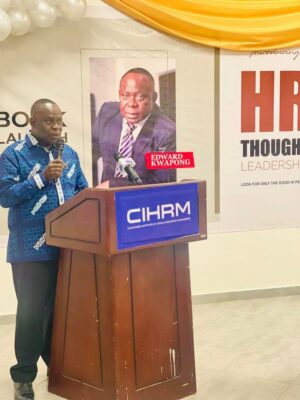President of the Chartered Institute of Human Resource Management Ghana (CIHRM), Dr. Edward Kwapong, has launched a book titled ‘HR Thought Leadership’ in respect to the practice, results and prospects of human resources in institutions.
The seminal book – which according to him is the culmination of four decades’ experience of human resource (HR) practice in Ghana and beyond – details the theoretical underpinnings of human resource practice, delving into the discipline’s prospects for the health of institutions.
The riveting 287-pager with 25 chapters presents the reader with great thoughts and insights on how to optimally harness human resources in institutions for growth and development.
Speaking at the book’s launch in Accra, Dr. Kwapong called on HR practitioners to shift from conservative, archaic processes of report-writing characterised by the use of dense prose and narrative to adopting analytics in generating user-friendly and attractive-to-read reports.
He explained that: “HR practitioners tends to be conservative in their processes and procedures, and getting them to make a shift is often met with resistance. In the past we have taken refuge in executive summaries to give a snapshot of HR reports’ contents; and good as that has been, a diagram or graph will speak volumes without laborious efforts at reading, synthesising and making meaning”.

Worryingly, he noted that unlike the law that dwells on established principles, precedent and logic in determining cases, HR is often left with no established principles, legislations or binding principles in expressing views and providing answers to questions raised – stressing the need for its practitioners to acquaint themselves with relevant laws and structured programmes for the sake of uniformity and consistency in opinions.
“It was for this reason that I selected a few HR topics – such as termination of the employment contract; pregnancy while serving probation; and conflicting provisions in offer letters vis-a-vis the collective agreement/conditions of service among others – for discussion in the book just to guide practitioners,” he added.
He further lamented that although management models and frameworks have been adopted for implementation and monitoring of strategy and other initiatives, HR is slow to adopt them – a reason for which he said: “I have devoted a chapter to the model and appealed that HR Practitioners should adopt it at least for a change, and also to flow and rhyme with other functions in delivering their mandate”.
Dedicating a chapter to HR audit, he highlighted the importance of institutions carrying out periodic audits of their function to engender stakeholders’ trust and confidence. He recommended application of the ‘Quality Circle’ concept to solicit ideas and find home-grown solutions to challenges at the workplace.
“HR works with policies and procedures, but hardly ever audits the application of same. It is when the employer is seeking to cut costs that a call is made for a manpower audit. A manpower audit is however a small fraction of the comprehensive audit of a company’s HR system,” he elaborated.
He encouraged all and sundry, particularly HR professionals, to get copies of the book so as to add to their knowledge as well as broaden their horizons on new perspectives of HR practice.
The colourful event was graced by traditional leaders, academicians, HR practitioners and media among others.










